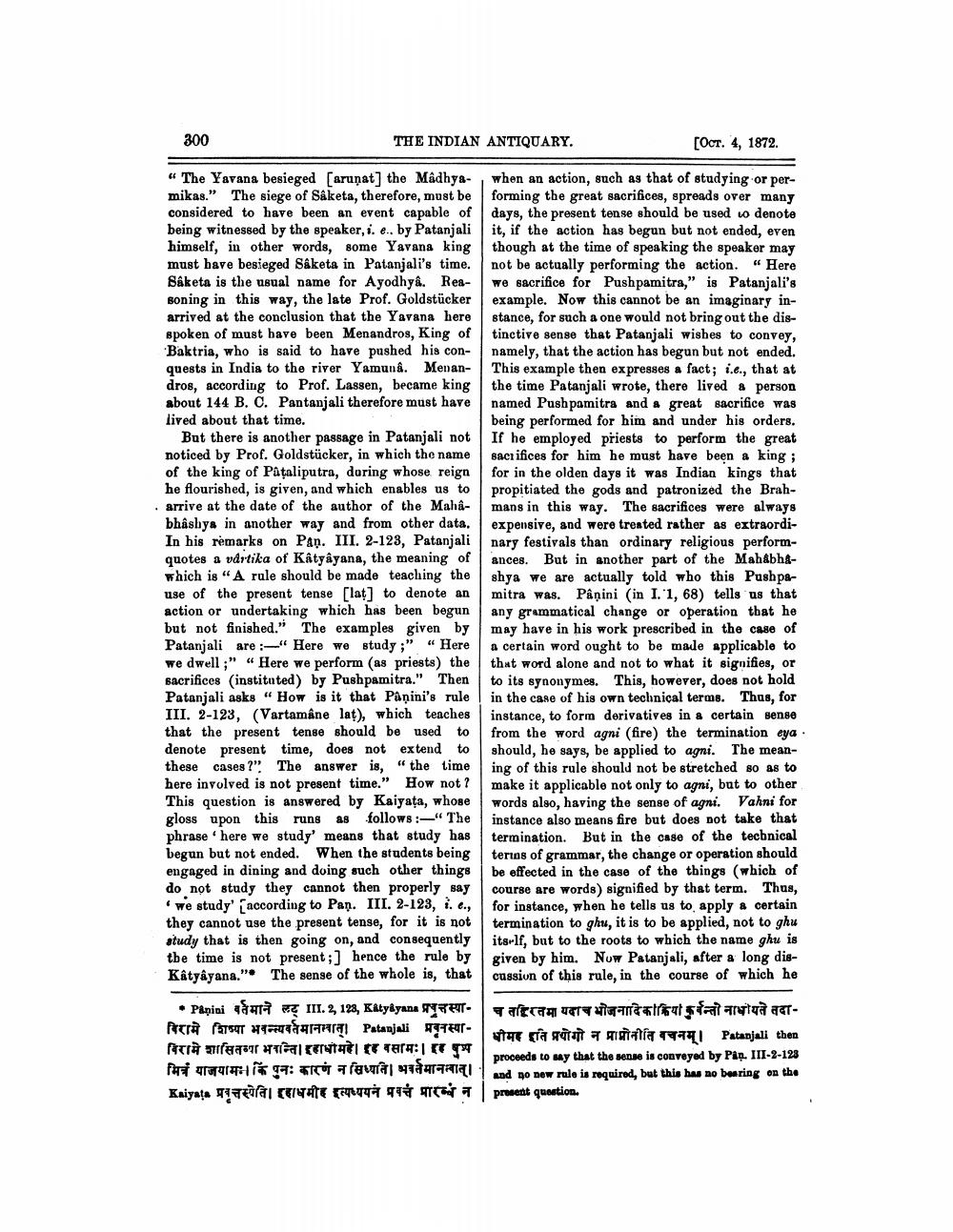________________
300
THE INDIAN ANTIQUARY.
[Oct. 4, 1872.
“ The Yavana besieged [aruņat] the Mâdhya- , when an action, such as that of studying or permikas." The siege of Såketa, therefore, must be forming the great sacrifices, spreads over many considered to have been an event capable of days, the present tense should be used to denote being witnessed by the speaker, i. e.. by Patanjali it, if the action has begun but not ended, even himself, in other words, some Yavana king though at the time of speaking the speaker may must have besieged Saketa in Patanjali's time. not be actually performing the action. "Here Saketa is the usual name for Ayodhyâ. Rea- we sacrifice for Pushpamitra," is Patanjali's Boning in this way, the late Prof. Goldstücker example. Now this cannot be an imaginary inarrived at the conclusion that the Yavana here stance, for such a one would not bring out the disspoken of must bave been Menandros, King of tinctive sense that Patanjali wishes to convey, Baktria, who is said to have pushed his con- namely, that the action has begun but not ended. quests in India to the river Yamuna. Menan- This example then expresses a fact; i.e., that at dros, according to Prof. Lassen, became king the time Patanjali wrote, there lived & person about 144 B. C. Pantanjali therefore must have named Pushpamitra and a great sacrifice was lived about that time.
being performed for him and under his orders. But there is another passage in Patanjali not If he employed priests to perform the great noticed by Prof. Goldstücker, in which the name sacrifices for him he must have been a king; of the king of Pataliputra, doring whose reign for in the olden days it was Indian kings that he flourished, is given, and which enables us to propitiated the gods and patronized the Braharrive at the date of the author of the Maha- mans in this way. The sacrifices were always bhâshya in another way and from other data. expensive, and were treated rather as extraordiIn his remarks on Paņ. III. 2-123, Patanjali nary festivals than ordinary religious performquotes a vdrtika of Kâtyâyana, the meaning of ances. But in another part of the Mahâbhdwhich is "A rale should be made teaching the shya we are actually told who this Pushpause of the present tense [lat] to denote an mitra was. Pâņini (in I. 1, 68) tells us that action or undertaking which has been begun any grammatical change or operation that he but not finished." The examples given by may have in his work prescribed in the case of Patanjali are:-"Here we study;" "Here a certain word ought to be made applicable to we dwell;" “ Here we perform (as priests) the that word alone and not to what it signifies, or sacrifices (instituted) by Pushpamitra." Then to its synonymes. This, however, does not hold Patanjali asks “How is it that Påņini's rule in the case of his own technical terms. Thus, for III. 2-123, (Vartamâne lat), which teaches instance, to form derivatives in a certain sense that the present tense should be used to from the word agni (fire) the termination eya. denote present time, does not extend to should, he says, be applied to agni. The meanthese cases ?" The answer is," the time ing of this role should not be stretched so as to here involved is not present time." How not?
make it applicable not only to agni, but to other This question is answered by Kaiyata, whose words also, having the sense of agni. Vahni for gloss upon this runs as follows:-"The
instance also means fire but does not take that phrase 'here we study' means that study has termination. But in the case of the technical begun but not ended. When the students being terios of grammar, the change or operation should engaged in dining and doing such other things be effected in the case of the things (which of do not study they cannot then properly say course are words) signified by that term. Thus,
we study' (according to Pan. III. 2-123, I. e., for instance, when he tells us to apply a certain they cannot use the present tense, for it is not termination to ghu, it is to be applied, not to ghu study that is then going on, and consequently its-lf, but to the roots to which the name ghu is the time is not present;] hence the rule by given by him. Nuw Patanjali, after a long disKâtyâyana.". The sense of the whole is, that cussion of this rule, in the course of which he
• Paņini qara ZT III.2 128, Katyayana - PTTÀ 754T Treuamarai Patanjali Erविरामे शासितव्या भवन्ति। इहाधामहे। इह वसामःगह पुष मित्रं याजयामः किं पुनः कारणं न सिध्यति। भवर्तमानन्वात्।। Kaiyata TITETI CEVATE TETETT 4* TC
च तधिरतमा यदाच भोजनादिकाक्रिया कुर्वन्तो नाधीयते वदा
the rat Thalia Tal Patanjali then proceeds to say that the sense is conveyed by Pap. III-2-128 and no new rule is required, but this has no bearing on the prosent question.




